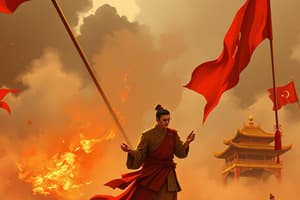Podcast
Questions and Answers
Nationalism aimed to unify China's ethnic and political divisions by fostering a sense of ______ identity.
Nationalism aimed to unify China's ethnic and political divisions by fostering a sense of ______ identity.
national
Sun Yat-sen's political philosophy, the Three Principles of the People, centered around ______, Democracy, and Livelihood.
Sun Yat-sen's political philosophy, the Three Principles of the People, centered around ______, Democracy, and Livelihood.
Nationalism
Democracy meant that the country should be governed by an elected legislature and executive, with free and fair ______.
Democracy meant that the country should be governed by an elected legislature and executive, with free and fair ______.
elections
Sun Yat-sen's presidency was marred by political infighting and a lack of popular ______.
Sun Yat-sen's presidency was marred by political infighting and a lack of popular ______.
In 1912, Sun Yat-sen resigned, and his former ally Yuan Shikai took ______.
In 1912, Sun Yat-sen resigned, and his former ally Yuan Shikai took ______.
Despite challenges, Sun Yat-sen continued to advocate for his political principles, and his influence endured long after his ______.
Despite challenges, Sun Yat-sen continued to advocate for his political principles, and his influence endured long after his ______.
Sun Yat-sen played a critical role in the overthrow of the Qing Dynasty and the establishment of the first Chinese ______
Sun Yat-sen played a critical role in the overthrow of the Qing Dynasty and the establishment of the first Chinese ______
Sun Yat-sen formulated the Three Principles of the People, which included Nationalism, Democracy, and ______
Sun Yat-sen formulated the Three Principles of the People, which included Nationalism, Democracy, and ______
Sun Yat-sen hailed from the southern Chinese province of ______
Sun Yat-sen hailed from the southern Chinese province of ______
At age 18, Sun Yat-sen sailed for Hawaii, where he studied at Iolani School and attended the University of ______
At age 18, Sun Yat-sen sailed for Hawaii, where he studied at Iolani School and attended the University of ______
In 1884, Sun Yat-sen left for the United States to study engineering at Omaha's Creighton University and medicine at Hartford's Clinton Medical ______
In 1884, Sun Yat-sen left for the United States to study engineering at Omaha's Creighton University and medicine at Hartford's Clinton Medical ______
Sun Yat-sen co-founded the Tongmenghui (Revolutionary Alliance) in 1905 with his fellow exile ______
Sun Yat-sen co-founded the Tongmenghui (Revolutionary Alliance) in 1905 with his fellow exile ______
Flashcards are hidden until you start studying
Study Notes
Sun Yat-sen and China's Transformative Journey
Sun Yat-sen, a pivotal figure in Chinese history, played a critical role in the overthrow of the Qing Dynasty, the establishment of the first Chinese republic, and the formulation of the Three Principles of the People—Nationalism, Democracy, and Livelihood—which would shape China's political landscape for decades to come.
Early Life and Education
Sun Yat-sen (1866-1925), born as Sun Wu, hailed from the southern Chinese province of Guangdong. He received a traditional Chinese education before enrolling in a Methodist missionary school in Hong Kong. At age 18, he sailed for Hawaii, where he studied at Iolani School and attended the University of Hawaii. In 1884, he left for the United States to study engineering at Omaha's Creighton University and medicine at Hartford's Clinton Medical College. In 1892, he returned to China.
Political Career
Sun Yat-sen's political career began in earnest when he co-founded the Tongmenghui (Revolutionary Alliance) in 1905 with his fellow exile Lu Xun. This organization sought to overthrow the Qing Dynasty and establish a republican form of government.
In 1911, Sun Yat-sen led a successful uprising in Wuchang, which sparked the Xinhai Revolution, ultimately leading to the end of the Qing Dynasty and the establishment of the Chinese Republic. Sun became the first president of the Republic of China.
The Three Principles of the People
Sun Yat-sen's political philosophy, the Three Principles of the People, centered around Nationalism, Democracy, and Livelihood. Nationalism aimed to unify China's ethnic and political divisions by fostering a sense of national identity. Democracy meant that the country should be governed by an elected legislature and executive, with free and fair elections. Livelihood aimed to provide a prosperous and equitable distribution of resources.
Later Life and Legacy
Sun Yat-sen's presidency, however, was marred by political infighting and a lack of popular support. In 1912, he resigned, and his former ally Yuan Shikai took power. Despite these challenges, Sun Yat-sen continued to advocate for his political principles, and his influence endured long after his death.
Sun Yat-sen passed away in 1925, but his legacy lived on. Posterity would remember him as a champion of Chinese democracy and nationalism, and his philosophy would shape the country's political landscape for decades to come.
Sun Yat-sen's contributions to Chinese history cannot be overstated. His role in overthrowing the Qing Dynasty, establishing the first Chinese republic, and formulating the Three Principles of the People have made him a pivotal figure in the country's modern history. As you explore further chapters of China's journey, you will undoubtedly encounter the enduring impact of Sun Yat-sen's vision and achievements.
Studying That Suits You
Use AI to generate personalized quizzes and flashcards to suit your learning preferences.





